Last weekend, I attended the opening of the Dover Maison Dieu where I was able to showcase the Dover Wesleyan Methodist Scrapbook. The scrapbook contains important ephemeral material which documents the religious, social and cultural history of Dover.
Background
The Dover Wesleyan Methodist Scrapbook was compiled by William Debenham Atkins (1847-1928). Atkins, who had a bootmaker’s business in King Street, was the Senior Circuit Steward of the Dover Wesleyan Circuit, Treasurer of the Snargate Street Chapel and Justice of the Peace. He was described as “one of the leading laymen in the Wesleyan Methodist Church in Dover, a man of high character, fervour, and habits in all that makes for righteousness” (Dover Express, 28 December 1928). His scrapbook records the history of Wesleyan Methodism in the Dover Circuit and includes letters, minutes, tickets and posters of Methodist events that took place in the town. Some of these events took place in the Dover Town Hall (also known as the Maison Dieu) and included concerts, lectures, bazaars and meetings. The Scrapbook was deposited with the CCCU Library archives by Reverend Harvey Richardson on behalf of the Dover and Deal Methodist Circuit in 2022.
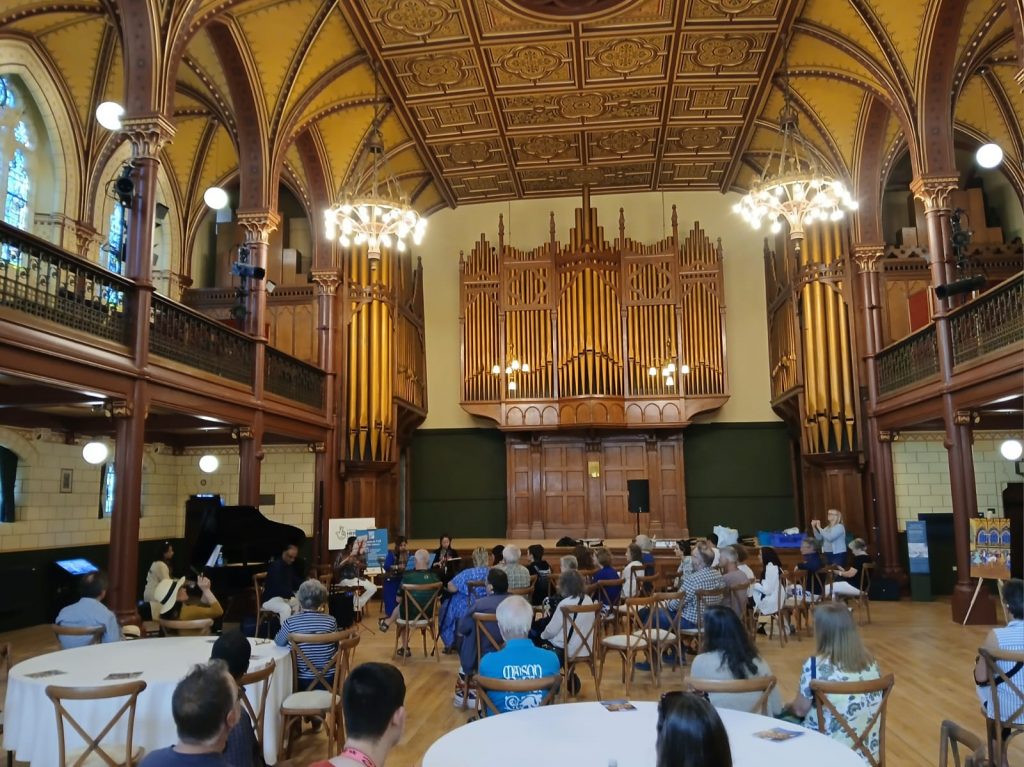
The Connaught Hall at the Dover Maison Dieu. Photograph by Martin Crowther
Preparing for the Event
The university’s Vision 2030 framework places collaboration, courage and creativity at its centre and is committed to strengthening student experience. The opening event of the Maison Dieu was a perfect opportunity to showcase the university archives and the work of its volunteers.
The scrapbook, which was fully digitized by three students as part of the Applied Humanities: Employability in Practice module in 2022, is very delicate so it had to be safely transported to the venue in a plastic tub surrounded by bubble wrap to ensure that it did not slide about. It was supported on an archives pillow and was arranged so that minimal handling would take place.
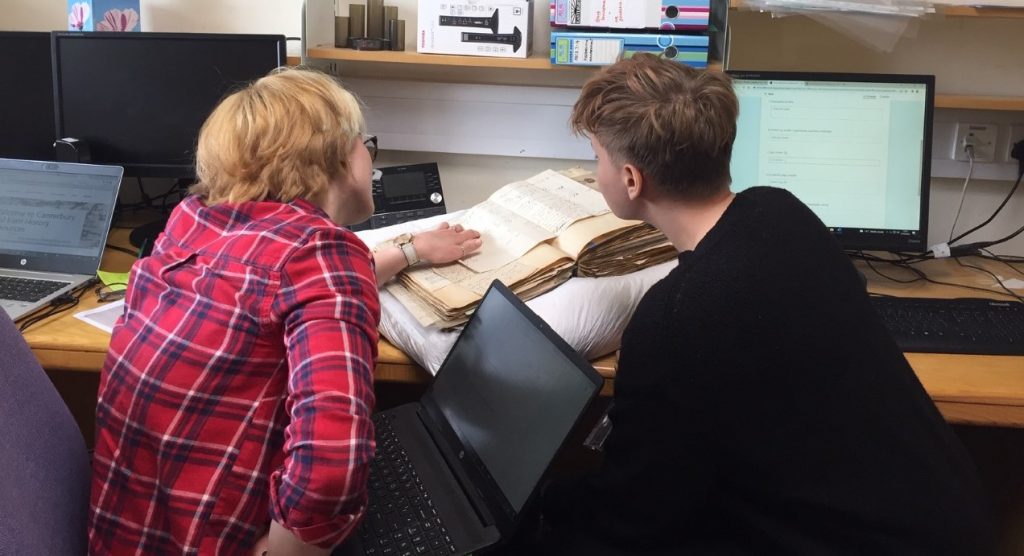
Lily-Belle Matten and Ez Swanström digitizing the Dover Wesleyan Methodist Scrapbook. Photograph by Michelle Crowther
Cam Matthews, third year history student, who is interested in pursuing a career in archives, volunteered at the event. Three items in the scrapbook were researched for the event, showcasing the involvement of the Wesleyan Methodists in civic life and these are detailed below. To accompany this research, Cam, who had been inspired by a recent archives talk he had attended “Archives Audio Hour” which explored sound in archives (History and Archives in Practice, 2025) created a playlist of the music played at one of the concerts which we had playing on the stand.
Item 1: West London Mission Public Meeting, Town Hall, Dover
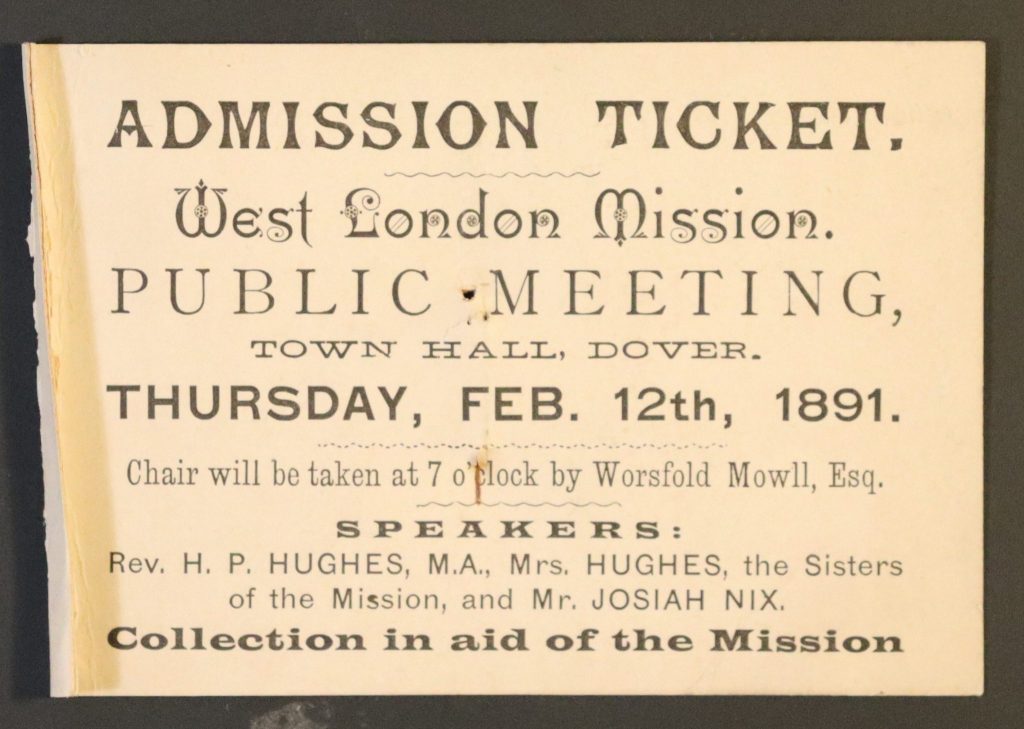
On Thursday 12th February 1891, members of the West London Mission came to speak at the Maison Dieu. The Mission had been established in 1887 under the leadership of Reverend Hugh Price Hughes to promote the teachings of the Wesleyan Methodists, but also to tackle poverty and social deprivation. Hughes, who had formerly served as a Minister in the Dover Circuit, was a strong advocate of the temperance movement and was remembered in the town for his lecture “The Black Bottle Delusion” in which he delivered some “telling thrusts at the hydra-headed monster – Intemperance.”[1] Blaming alcoholism for 60,000 “unnecessary corpses” in the nation’s churchyards, Hughes had appealed for teetotalism. As Dover had 226 public houses during his ministry, it had its fair share of inebriates and social problems.
Unconsciously sown in Dover
At the 1891 meeting, Hughes said that “the seed of all that they were doing in the West of London was unconsciously sown in Dover” and that he was “carrying on in a great sphere there what he was led by the mercy and providence of God to begin in a very humble sphere in Dover.”[2] The meeting began with prayer and was followed by a reading from Matthew 13: 47: “Again, the kingdom of heaven is like unto a net, that was cast into the sea, and gathered of every kind: which, when it was full, they drew to shore, and sat down, and gathered the good into vessels, but cast the bad away. So shall it be at the end of the world: the angels shall come forth, and sever the wicked from among the just.”
Hugh Prices Hughes, Public domain, via Wikimedia Commons
Drink to be their biggest obstacle
Hughes was accompanied on his visit to Dover by his wife Katherine, Sister Lily and Mr Josiah Nix. Katherine and Sister Lily spoke about the work of the sisterhood of the Mission which was warmly supportive of women’s suffrage. They had established branches in district visiting, nursing, mother’s meetings, sewing classes and relief work. Katherine said that “they found drink to be their biggest obstacle, for three-fourths of the sin and misery which existed was caused by the drink.”[3]
Hughes praised the “beautiful hall” which was one of Dover’s “recent improvements”. He was referring to the Connaught Hall which had opened in 1883, eleven years after he had completed his ministry in Dover. You can read more about Hugh Price Hughes on Kent Maps Online.
Item 2: Bishop Hawkins’ Slave Life and My Escape

On 3rd July 1891, the Dover Express enthusiastically announced, “The Black Bishop is coming!” Twelve days later, Bishop Walter Hawkins, the General Superintendent of the British Methodist Episcopal Church of Canada, delivered a lecture on his life as a slave at the Maison Dieu to a packed audience. He was on a nation-wide tour to raise funds for the building of churches for the black communities of Canada.
A kitchen in Heaven
Born into slavery at Georgetown, Maryland, c. 1809-9, Walter Hawkins was sold by a slave dealer to the sister of a wealthy Virginian for $900. He worked on her plantation as a ploughman, both experiencing and witnessing the brutal conditions of slavery. It was during this period that he heard Christian ministers endorsing slavery. He said that the slaves were taken to church once a month by their masters, where they were told that there was a kitchen in Heaven and if they obeyed their masters, they would be able to eat at it. He said that the slaves used to assemble at midnight (after their masters retired to rest) to pray and sing; but that they were fearfully punished if it was found out. They would receive fifty lashes on their bare back, each stroke cutting the flesh in two, and then were tortured by having pepper, tea, and hot salt water poured over them, which caused great agony.
A two-legged blood-hound
In 1825, Hawkins ran away from the plantation, pursued by the Constable whom he described as a “two-legged blood-hound”. With help from friends, he travelled to Baltimore, experiencing adventures on his way as he evaded capture. In 1850, the passing of the Fugitive Slave Law, which required captured fugitive slaves in free states to be returned to their masters, motivated Walter to move to Canada. He described the joy he felt when he crossed over on to British soil. He concluded his lecture by singing “I’m on my way to Canada, where the coloured man is free,” which was heartily encored. The Dover Express reported that the Wesleyans of Dover, “who are from time to time bringing celebrated men to our Town Hall, have made a rare hit this time”.
Item 3: High Class Concert in the Town Hall
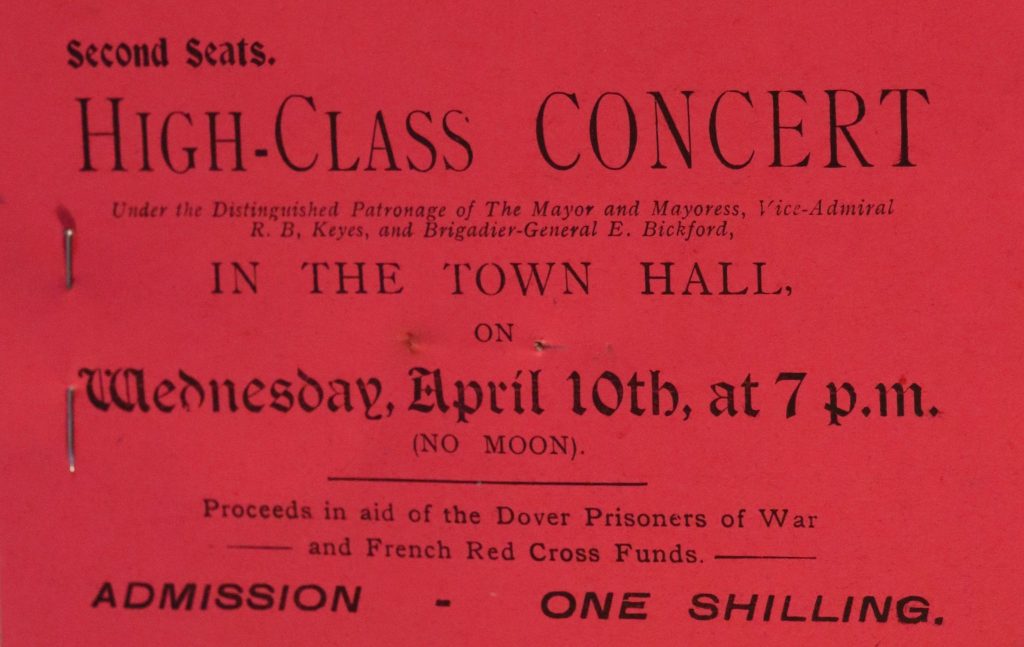
On Wednesday 10th April 1918, a high-class concert under the patronage of the Mayor and Mayoress, Edwin and Mrs Farley; Vice Admiral Keyes; and Brigadier General Bickford took place in the Town Hall to raise money for the Dover Prisoners of War and the French Red Cross Funds.
Zeebrugge Raid
Vice Admiral Keyes was Commander of the Dover Patrol which protected the Channel from enemy shipping. Appointed in January 1918, he implemented new tactics, which led to the sinking of five U-boats in the first month compared with just two in the previous two years. He also planned and led the raids on the German submarine pens in the Belgian ports of Zeebrugge and Ostend. Originally planned for the 2nd of April, but delayed because of wind direction, the Zeebrugge Raid took place on the 23 April 1918, thirteen days after the concert. Although the number of casualties was high, the British propaganda machine declared it a victory and eight Victoria crosses were awarded for bravery. The King of Belgium gave the town of Dover a bell to commemorate the raid which hangs outside the Maison Dieu.
The Zeebrugge Bell by Colin Smith, CC BY-SA 2.0, via Wikimedia Commons
Brigadier-General Bickford who commanded the Dover Garrison retired whilst Dover was preparing for the Zeebrugge Raid. His successor, Major General Hickie recommended that the town evacuate after the raid fearing reprisals, however, the Mayor refused, focussing instead on a new appeal to raise money for the widows and children of the men lost in the raid. [4]
The audience stood for the Marseillaise
The High Class concert opened with “La Marseillaise” and was followed by music and recitations including The Bohemian Girl, It’s Only a Tiny Garden, Down There, Pretty Mocking Bird, My Heart is Light, Roses of Picardy, The Farmer’s Pride, Floral Dance, Watchman, What of the Night and The Highway Man by Alfred Noyes . [5]
The Maison Dieu re-opening
The Grade I Listed Maison Dieu (Dover Town Hall) has recently undergone a £10.5m restoration project Reawakening the Maison Dieu thanks to a £4.27m grant from The National Lottery Heritage Fund. Around 3,000 people attended the two-day opening event, and the Dover Wesleyan Methodist Scrapbook was admired by a steady stream of visitors.
Cam Matthews on the stand with the scrapbook. Photograph by Michelle Crowther.
Thank you to Dr John Bulaitis who arranged the project, Rev Harvey Richardson who deposited the scrapbook, Sue Boulden who undertook extensive research on the scrapbook, Lily-Belle Matten, Ez Swanström and Amy Rose who worked on the project, and Cam Matthews for volunteering to support the event.
[1] “The Black Bottle Delusion.” Dover Express – Friday 25 April 1873.
[2] “The Rev. Hugh Price Hughes at Dover.” Dover Chronicle – Saturday 14 February 1891.
[3] “The Rev. Hugh Price Hughes at Dover.” Dover Chronicle – Saturday 14 February 1891.
[4] The Dover Historian. 1918 April – Dover and a new enemy attacks.
[5] “Concert at the Town Hall.” Dover Express – Friday 12 April 1918.
 Library
Library Michelle Crowther
Michelle Crowther 1204
1204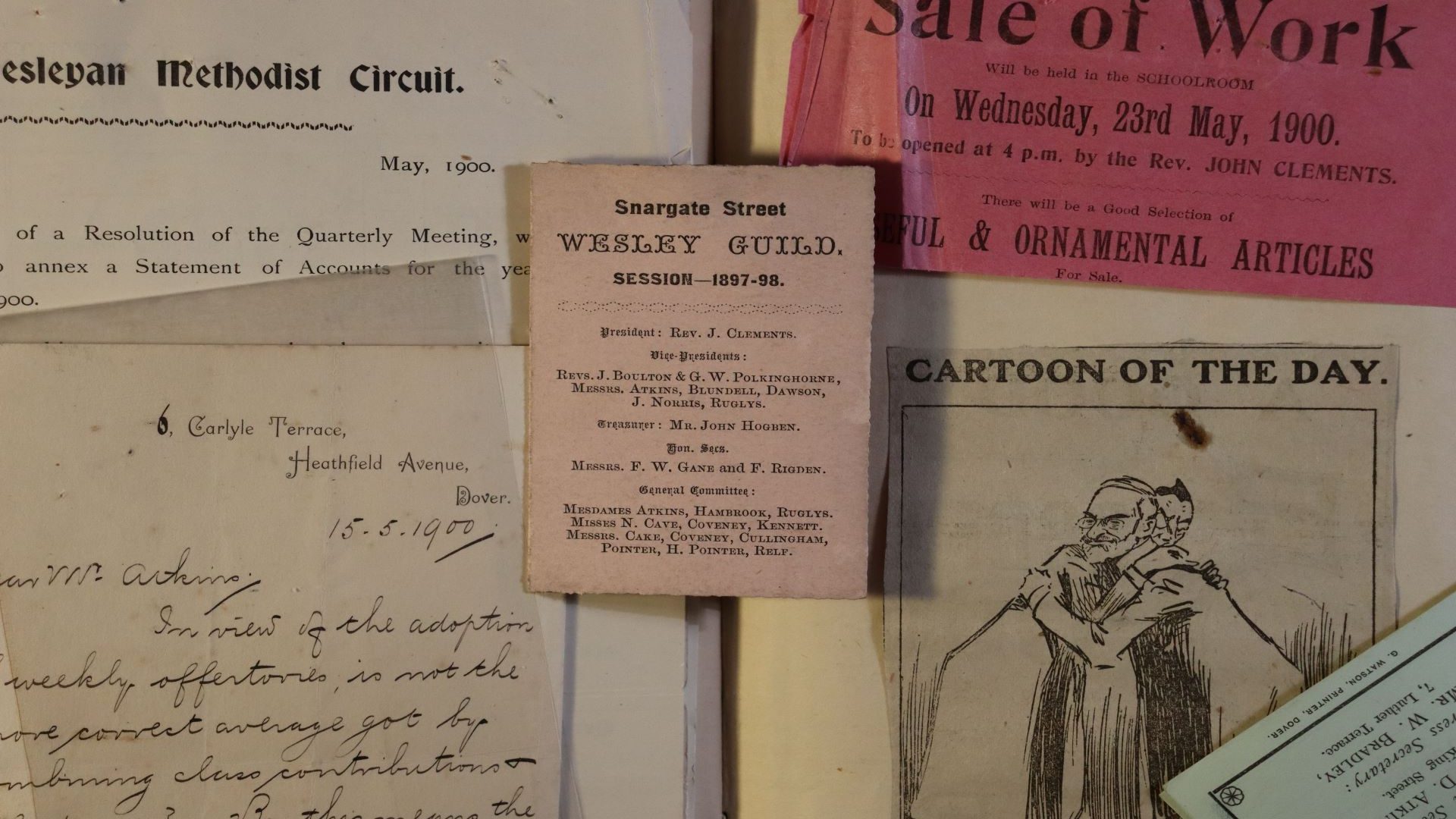
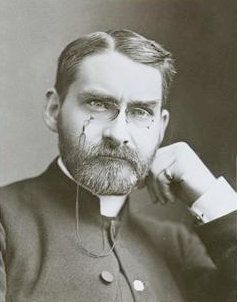
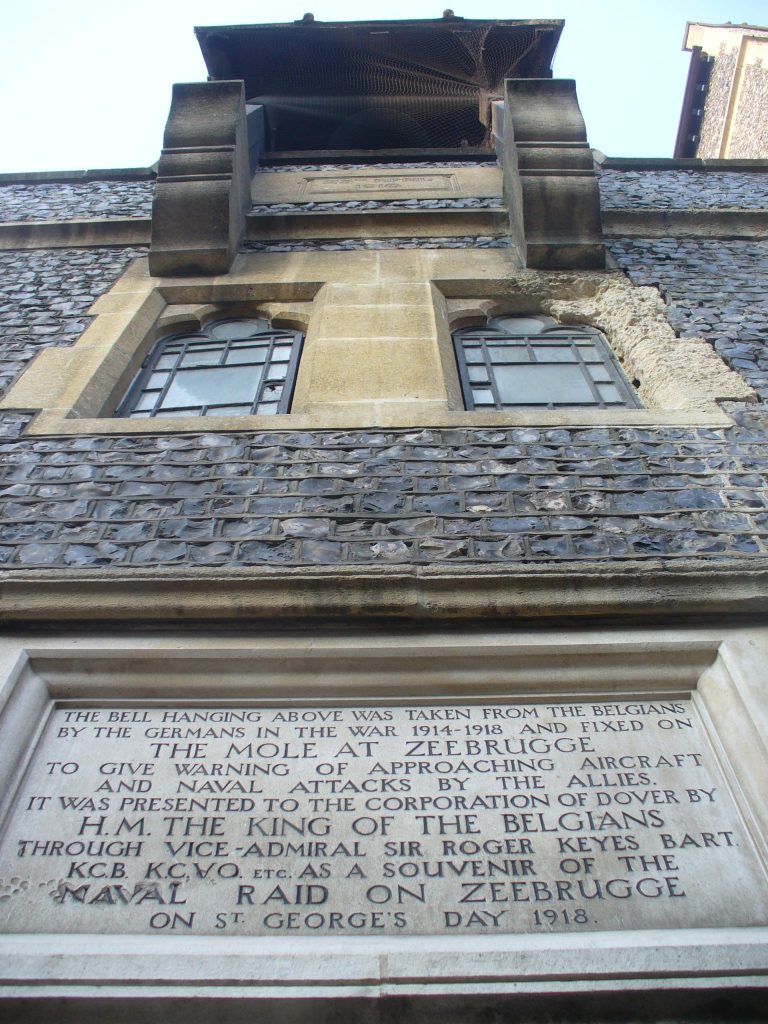
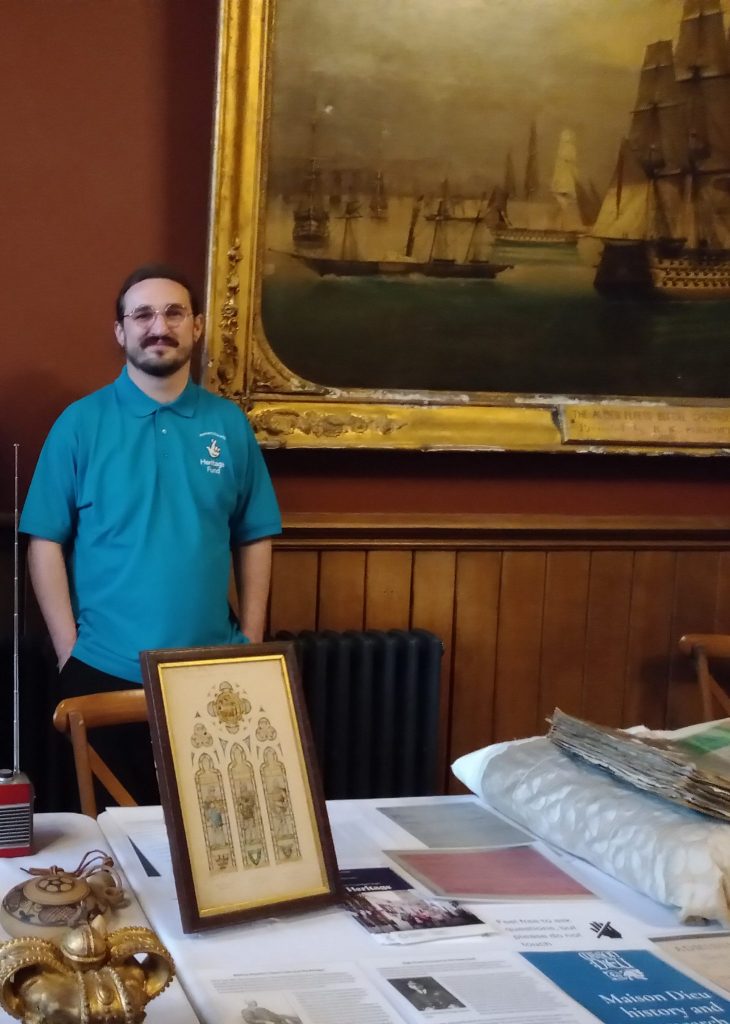



This is a wonderful contribution to the social and religious history of the Wesleyan Methodist movement in Dover, and expecially the links with characters like Hugh Price Hughes. H P Hughes lodged with my great-grandfather and family in 1 Buckland Terrace, Dover, while he was the minister in Buckland from 1869-72. My grandfather and a great-aunt were baptised by him in 1872.
Thank you, Michelle, for a very special contribution.
Harvey Richardson